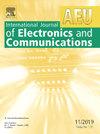Mitigating performance degradation of RIS due to element failures using a genetic algorithm-based sparse array strategy
IF 3
3区 计算机科学
Q2 ENGINEERING, ELECTRICAL & ELECTRONIC
Aeu-International Journal of Electronics and Communications
Pub Date : 2025-03-20
DOI:10.1016/j.aeue.2025.155770
引用次数: 0
Abstract
A Genetic Algorithm (GA)-based sparse array strategy is introduced to mitigate the performance degradation of Reconfigurable Intelligent Surfaces (RIS) in satellite communication systems due to reconfigurable element failures in this paper. Such failures hinder real-time adjustment via Field Programmable Gate Array (FPGA), leading to permanent open or short circuit conditions. Modeling the remaining operational elements as sparse array elements and optimizing their states with a GA, a new compensation phase distribution can be obtained. Based on this optimized result, the phase states of the remaining operational elements can be dynamically adjusted using an FPGA, thereby mitigating the degradation in RIS radiation performance. This study systematically analyzes the impact of varying failure rates on RIS performance and evaluates the effects of different beam steering angles at a failure rate of 50 % with identical failed elements. The experimental results show the RIS performance enhancement, with a maximum peak gain improvement of 3.26 dB under varying failure rates and 7.1 dB with different beam steering angles.
使用基于遗传算法的稀疏阵列策略减轻由于元件失效导致的RIS性能下降
提出了一种基于遗传算法的稀疏阵列策略,以缓解卫星通信系统中可重构智能曲面(RIS)因可重构元件失效而导致的性能下降。这种故障阻碍了现场可编程门阵列(FPGA)的实时调整,导致永久开路或短路。将剩余的运行元素建模为稀疏阵列元素,利用遗传算法对其状态进行优化,得到新的补偿相位分布。基于此优化结果,可以使用FPGA动态调整剩余工作元件的相位状态,从而减轻RIS辐射性能的下降。本研究系统分析了不同故障率对RIS性能的影响,并在相同失效元件的故障率为50%的情况下,评估了不同光束转向角度对RIS性能的影响。实验结果表明,RIS的性能得到了提高,在不同故障率下最大峰值增益提高了3.26 dB,在不同波束转向角度下最大峰值增益提高了7.1 dB。
本文章由计算机程序翻译,如有差异,请以英文原文为准。
求助全文
约1分钟内获得全文
求助全文
来源期刊
CiteScore
6.90
自引率
18.80%
发文量
292
审稿时长
4.9 months
期刊介绍:
AEÜ is an international scientific journal which publishes both original works and invited tutorials. The journal''s scope covers all aspects of theory and design of circuits, systems and devices for electronics, signal processing, and communication, including:
signal and system theory, digital signal processing
network theory and circuit design
information theory, communication theory and techniques, modulation, source and channel coding
switching theory and techniques, communication protocols
optical communications
microwave theory and techniques, radar, sonar
antennas, wave propagation
AEÜ publishes full papers and letters with very short turn around time but a high standard review process. Review cycles are typically finished within twelve weeks by application of modern electronic communication facilities.

 求助内容:
求助内容: 应助结果提醒方式:
应助结果提醒方式:


